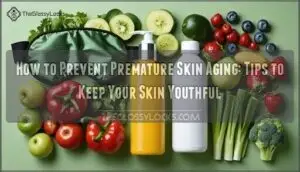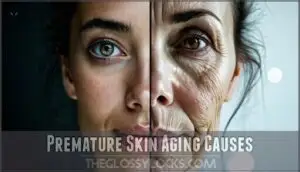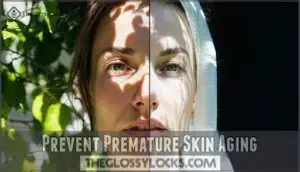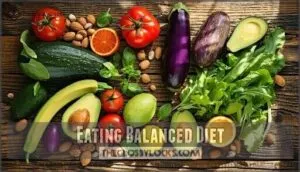This site is supported by our readers. We may earn a commission, at no cost to you, if you purchase through links.

Protect your skin by wearing hats, sunglasses, and avoiding too much midday sun. Quit smoking and limit alcohol since they can speed up aging.
Eat a diet rich in fruits, veggies, and omega-3s, and drink plenty of water to keep your skin hydrated. Prioritize sleep and manage stress—it’s called beauty sleep for a reason!
Table Of Contents
- Key Takeaways
- Premature Skin Aging Causes
- Prevent Premature Skin Aging
- Protecting Skin From Sun
- Healthy Lifestyle Habits
- Maintaining Youthful Skin
- Frequently Asked Questions (FAQs)
- Can premature skin aging reversed?
- Can skin aging be prevented?
- How to prevent early aging?
- What vitamin prevents premature aging?
- How does genetics influence premature skin aging?
- Are certain skin types more prone to aging?
- What role do hormones play in skin aging?
- Can indoor lighting contribute to skin damage?
- Conclusion
Key Takeaways
- Use sunscreen with SPF 30+ daily and reapply every two hours to protect your skin from UV damage.
- Quit smoking, limit alcohol, and eat a diet rich in fruits and veggies to support skin health.
- Get 7–9 hours of quality sleep each night and manage stress to help your skin repair and regenerate.
- Stay hydrated, exercise regularly, and wear protective clothing to maintain your skin’s elasticity and prevent aging.
Premature Skin Aging Causes
Your skin ages prematurely due to factors like UV damage, smoking, poor diet, and lack of sleep.
Premature skin aging stems from UV exposure, smoking, poor diet, and lack of sleep—protect your skin to maintain its youthful glow.
These habits and exposures break down collagen, dehydrate your skin, and accelerate visible aging.
Photoaging and UV Damage
UV radiation effects, like wrinkles and age spots, are major drivers of premature skin aging.
Sunscreen application with SPF 30+ is essential for sun damage protection.
HEV light from screens also accelerates aging, so antioxidant protection can help.
Avoid tanning beds—20 minutes equals a day’s sun exposure.
Prioritize premature aging prevention by limiting UV light and managing sun exposure wisely.
Smoking and Toxin-Induced Damage
Smoking drains your skin’s youth by destroying collagen and hydrating layers, leaving wrinkles and sagging in its path.
Toxin exposure effects from cigarettes and pollution restrict oxygen flow, accelerating premature aging.
Vaping’s impact? It’s no better, worsening skin dullness and elasticity loss.
Protect your skin by quitting smoking and minimizing secondhand smoke and pollution exposure for lasting vibrance.
Unhealthy Diet and Lifestyle
Skipping fruits and vegetables for sugary foods won’t do your skin any favors. An unhealthy diet wreaks havoc, promoting wrinkles and dullness. Combine that with alcohol and you’ve got dehydrated, damaged skin.
- Avoid refined carbs; they speed up aging.
- Limit processed foods.
- Eat antioxidant-rich produce.
- Choose healthy fats like avocado.
- Stay hydrated to maintain skin elasticity.
Poor Sleep and Stress
Stress and lack of sleep speed up premature aging by disrupting your body’s repair processes.
Poor sleep lowers skin health and triggers hormonal imbalance, while stress increases cortisol levels, accelerating cellular aging.
It’s a cycle—worrying keeps you up, sleepless nights show on your face.
Protect your skin by managing stress and prioritizing seven to nine hours of quality sleep nightly.
A balanced diet can also help reduce collagen breakdown and oxidative stress by promoting overall health and skin health.
Prevent Premature Skin Aging
Understanding skin aging causes is key to prevention.
To prevent premature aging, focus on a consistent skincare routine. Start with cleansing and moisturizing daily, and don’t skip sunscreen even on cloudy days.
Hydration is your skin’s best friend—drink plenty of water and use products with hydrating ingredients like hyaluronic acid. A balanced diet rich in antioxidants, such as fruits, vegetables, and fatty fish, can protect against skin damage while keeping wrinkles at bay.
Sleep matters, too. Aim for 7–9 hours a night, and try sleeping on your back to prevent wrinkles. Maintaining weight stability helps avoid skin stretching and sagging over time.
These habits, small but essential, stack up to slow premature aging and keep your skin looking its best. Incorporating vitamin C serum benefits in the morning can further protect the skin.
Protecting Skin From Sun
Protecting your skin from the sun is one of the most effective ways to prevent premature aging.
Using sunscreen, wearing protective clothing, and avoiding the midday sun can substantially reduce UV damage, which is a complete method to prevent skin damage.
Using Broad-Spectrum Sunscreen
Protecting your skin starts with daily sunscreen. Broad-spectrum sunscreen provides UV protection, shielding against sun damage that leads to skin aging.
Choose one with SPF 30 or higher and look for sunscreen ingredients like zinc oxide. Don’t forget SPF reapplication every two hours, especially during sun exposure.
Consider exploring options for effective sun protection to find the best fit. These sunscreen benefits can keep your skin youthful and healthy longer, with the goal of achieving effective sun protection.
Wearing Protective Clothing
Wearing protective clothing is a simple way to shield your skin from sun exposure and prevent aging.
Go for long-sleeved shirts, wide-brimmed hats, and pants made from sun protective fabrics.
Light-colored, tightly woven fabrics offer great UV protection.
Layering strategies, like combining sunscreen with your outfit, enhance defense during outdoor activities. Consider specialized sun garments for enhanced protection.
Smart fabric choices mean healthier, younger-looking skin, and this is a key aspect of younger-looking skin care.
Avoiding Midday Sun
Peak hours for UV intensity usually fall midday when the sun’s strongest. To limit photoaging and boost sun safety, tweak your daily schedule.
Stay indoors or seek shade during the sun’s zenith. These small changes can make a big difference for skin aging prevention.
- Avoid sun exposure between 10 AM and 4 PM.
- Use sunscreen diligently.
- Wear sunglasses for UV protection.
- Plan outdoor activities early or late to enhance sun safety.
Healthy Lifestyle Habits
Your daily habits play a huge role in how your skin ages over time.
Staying active, eating nutritious foods, staying hydrated, and avoiding harmful substances like tobacco and alcohol can keep your skin looking refreshed and youthful.
This is a single concept, so no further separation is needed.
Quitting Smoking and Alcohol
Smoking’s skin impact goes beyond wrinkles; it breaks down collagen, leading to sagging and dullness.
Alcohol’s dehydration leaves skin dry and lifeless.
Quitting benefits your skin with noticeable recovery in as little as a month, and small steps to reduce smoking and alcohol consumption can dramatically improve skin aging prevention over time.
Establish a solid support system to stay on track, which is crucial for maintaining the progress made towards reducing alcohol consumption.
Eating Balanced Diet
Eating a balanced diet is essential for healthy skin aging.
It’s not just what you eat but what you skip—like sugar and refined carbohydrates.
Focus on:
- Dietary antioxidants from fruits and vegetables.
- Healthy fats in avocados and olive oil.
- Protein intake to repair skin.
- Fiber-rich whole grains.
- A variety of colorful foods to fight damage effectively.
Regular sunscreen use is part of essential skin protection.
Staying Hydrated and Exercising
Drinking plenty of water keeps your skin hydrated, helping with skin elasticity and suppleness.
Exercise boosts circulation, delivering nutrients for healthier, glowing skin. Aim for moderate workouts three times a week to improve skin hydration and health.
Plus, sweating clears pores naturally—but remember hydration skincare after! Proper care includes effective hydration methods.
Together, these habits support skin’s bounce and help fight premature aging.
Maintaining Youthful Skin
You can keep your skin youthful by focusing on healthy habits that protect and nourish it.
Prioritize good sleep, a balanced diet rich in omega-3s and antioxidants, and limit exposure to pollutants and toxins.
Getting Enough Sleep and Reducing Stress
Good sleep isn’t just for energy—it’s your skin’s repair shop.
Poor sleep raises stress hormones like cortisol, breaking down collagen and slowing skin regeneration.
Prioritize mental wellbeing with relaxation techniques to reduce stress.
Deep breathing or a calming routine before bed improves sleep quality for skin revitalization.
Think of sleep for skin as hitting your reset button nightly.
Eating Foods Rich in Omega-3 and Antioxidants
Healthy skin starts on your plate.
Omega-3 benefits include reducing fine lines and boosting elasticity, with sources like salmon, flaxseeds, and walnuts.
Antioxidant-rich fruits and vegetables, such as berries and spinach, help neutralize free radicals.
For skin hydration, snack on cucumber or watermelon.
Combine these in a healthy skin diet to protect and nourish your skin.
Regular exercise can also help to nourish skin cells, which is an essential part of skin hydration and overall skin health.
Avoiding Environmental Pollutants and Toxins
Environmental factors like pollution accelerate extrinsic aging by damaging collagen and causing dark spots.
To reduce toxin exposure and protect your skin:
- Use antioxidant skincare products with ingredients like niacinamide and vitamins C/E.
- Improve air quality indoors with HEPA filters or ventilation.
- Wear sunscreen and barrier creams to shield against pollution effects while outdoors.
Simple steps make a big difference!
Frequently Asked Questions (FAQs)
Can premature skin aging reversed?
You can’t fully reverse premature skin aging, but you can reduce its appearance.
Focus on sunscreen, moisturizing, sleep, and quitting smoking.
Use retinol, antioxidants like vitamin C, and consider professional treatments for better results.
Can skin aging be prevented?
Think of your skin as armor—daily protection preserves its strength.
Use sunscreen, hydrate, eat nutrient-rich foods, and sleep 7–9 hours.
Quit smoking, manage stress, and follow a simple skincare routine for youthful skin.
How to prevent early aging?
Protect your skin by using sunscreen daily, eating antioxidant-rich foods, and staying hydrated.
Quit smoking, manage stress, and get 7-9 hours of sleep.
Regular exercise improves circulation, while a simple skincare routine boosts skin health.
What vitamin prevents premature aging?
Vitamin C is your skin’s best friend for preventing premature aging.
It boosts collagen production, improves elasticity, and fights damage caused by free radicals.
Add citrus fruits, berries, and supplements to keep your skin glowing.
How does genetics influence premature skin aging?
Your genetics play a big role in how your skin ages.
They dictate collagen levels, skin elasticity, and how quickly cells repair damage.
While you can’t control genes, solid skincare and lifestyle choices help counteract genetic aging.
Are certain skin types more prone to aging?
Oily skin often ages slower due to natural moisture, while dry skin tends to show lines faster.
Fair skin types are more prone to sun damage, accelerating aging.
Protect your skin regardless of its type.
What role do hormones play in skin aging?
Did you know hormonal changes account for noticeable aging signs like thinner skin and wrinkles?
Estrogen boosts collagen, keeping skin firm, while declining levels can cause dryness and sagging.
Balance your hormones for healthier, youthful skin.
Can indoor lighting contribute to skin damage?
Yes, indoor lighting can harm your skin.
LED lights and screens emit blue light, which accelerates aging and pigmentation.
Use sunscreen indoors and consider blue light-blocking products to protect your skin, even at home.
Conclusion
While aging is natural, premature skin aging isn’t inevitable.
Small changes, like daily sunscreen and omega-3-rich meals, can protect your skin while quitting smoking and reducing stress preserve its youthful glow.
Sun damage and poor lifestyle habits speed aging, but healthier choices slow it down.
Proper hydration, sleep, and avoiding midday sun go a long way.
To prevent premature skin aging, focus on protecting, nourishing, and caring for yourself—it’s never too early to start, and making these choices can lead to a more youthful appearance.
- https://health.clevelandclinic.org/advertising
- https://www.ncbi.nlm.nih.gov/pmc/articles/PMC7150393/
- https://pubmed.ncbi.nlm.nih.gov/22506801/
- https://academic.oup.com/asj/article/36/8/931/2613967
- https://www.merckmanuals.com/home/older-people%E2%80%99s-health-issues/the-aging-body/changes-in-the-body-with-aging












